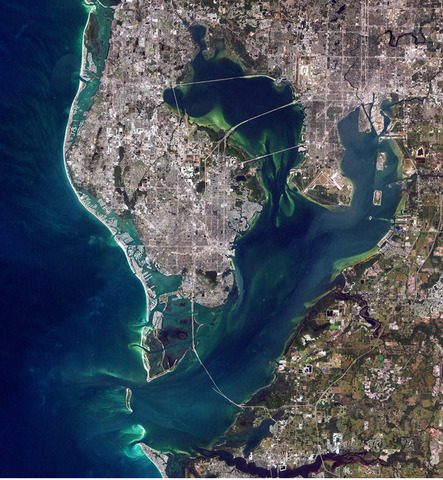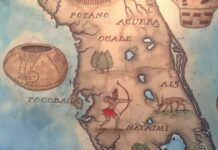Information is something that in the hands of the ethical is a valuable tool. In the hands of the unethical, that data can be trouble. You have gone out and scouted, learned how to fish areas and have come up with your blueprint for fishing that area. You can have the map mentally or you can actually make the marks on maps. But what do you plan to do with this knowledge? If your expectations are to have successful trips there again, you should read this whole article and then think about this closely. If you would like to not negatively impact the fishery with some of your decisions, maybe you should read it twice.
A common misconception is that there are magical areas that have great fishing 100% of the time. Fish travel and while there are great locations to intercept them, areas that have great fishing seasonally or at certain stages of cycles are not “sure things” all the time. With effort and study, anglers can build great knowledge and have sets of productive points that are going to be their action plan for fishing an area.
Herein lays the decision: Do I keep it to myself or do I put it “out there.” Very detailed “X’s on maps” posted to public locations isolating the best places to fish is a risk. In the hands of the unethical it is the tool for a variety of problems for not just you but anyone who liked to fish there and very likely going to be detrimental to that fishery. Taking people to your best locations holds similar risks: What will they do with the knowledge? This so easily snowballs into “friends of friends” in locations you showed them.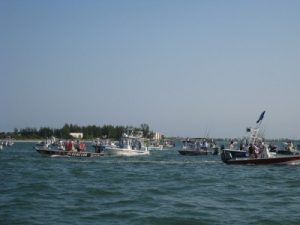
Our waterways and aquatic life are public treasures so anyone who believes a particular location is “theirs” is at the very least naïve. This article is not talking about extremely “public” areas but the applications may be the same. Shared information leads to extra pressure on those locations as well. It can apply to high profile public locations, backwater locations and even to “numbers” for the offshore anglers. “Pirating numbers” was something I experienced fishing with Brian and Billy in my first years living in Florida. It was actually my job to get the anchor up as fast as possible if another boat was approaching from way off in the distance. Amazing but true, there are people who will speed up to another boat offshore just to use their GPS to mark the spots where other people are anchored. We would see those boats back out there fishing those areas on subsequent trips.
What’s worse than gill nets?
Web site “forums” are no longer a novelty. With the majority of the United States population using both social media and web sites as part of their daily routine, the outdoor hobbies of people quickly became a sharing of experiences and information. Both good and bad, the conflicts that occur are widespread. Many people didn’t know the risks until the damage was done. Thinking that they are “making friends” or creating an image of expertise, posters would share information in fascinating detail. Some people defend those decisions as being a “team player” but most (if not right away) eventually realized the hazards of specific information. The internet very obviously efficiently funneled information to various user groups. The nature of the information is the biggest variable.
Even before internet sites, the sharing of information was something I saw create rifts between acquaintances, close friends and also complete strangers. The risk of taking anyone to a great fishing location became obvious. Even when people agreed to keep information private, human behavior as it is, locations became overrun when shared information went viral. A location that a person fished by themselves for years that has five or more boats there every time they try to go there is definitely not a coincidence or accident. The most interesting situations were the promises made to keep information private then later “confessions” that they broke their vow.
Look at my fish!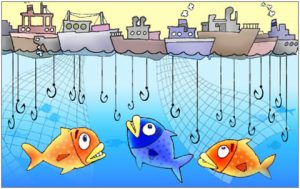
Still photos with the background showing can also give perfect clues to the location of where someone went fishing. There are landmarks in some photos that are very easy to recognize, others that are more subtle but people are watching and if they put two and two together, they know where you’re fishing, what you’re catching and you’re likely to have some company the next time you go there. I won’t share those photos and usually get in a position where the background does not show anything telling. It is my decision and within my rights to do it this way. Ask other internet sensations if they have ever gotten negative feedback from freely posting photographs with great background details. One by one, so many of the people who were defensive about their sharing of photos discontinue showing photos with any recognizable background and encourage others to do the same.
Amazingly enough, things could be much worse than they are. For one- So many places do look similar; pirate “hole jumpers” may misinterpret a location from a photo. Also, accurate shared information may not be that valuable to people with poor skills or a lack of knowledge on how or when to fish a location. They consider it bad information and move on.
It is not just something in the general community but also a media problem. People read the newspapers and they pay attention to other media outlets. Television “fishing shows” are blatantly guilty of showing too many landmarks. One incident few years ago resulted in boats immediately stacked up in the location with people tangling lines, fighting with one another and keeping illegal fish. It has become a location where it is literally impossible to go to for several months of the year since that show aired.
The fact of the matter is many of these situations are avoidable. Members of large internet communities usually have message systems or know someone well enough where they can share more sensitive information in a non-public way. As the owner of www.capmel.com, the policy was set where exact information is not allowed, for that very reason- There are other methods of divulging things you want to share. The other reason was already mentioned: Professional poachers have told me to my face that they get their ideas on where to go from this web site and others, making it easier for them to know where to go. Some internet forums make membership a prerequisite for viewing “reports” sections but that does not prevent the unethical from going through the small steps of becoming a registered member and seeing the data.
Examples of shared info “gone wrong” are common. In one situation, the repercussions were severe. Rampant poaching occurred from the knowledge of a location and general overfishing ever since. This is the same result as other incidents of “X’s on a map”. The perpetrator of this breach of trust was someone who agreed to keep it to himself. Despite an agreement before being shown the area (and several reminders) the information was broadcast out and when people realized what it was they were seeing, it was a massacre. One poacher was caught with nine resource violatons.
There is what I call a “Magnification Factor”. Added pressure to a single location is threefold in where the people are drawn from. The first set of people is the lazy people who are not intelligent enough to figure out where to find fish on their own. The second set of people are those that do not have any knowledge at all and looking for tips on where to go. The last and most destructive entity is the professional poacher who will catch and keep everything they can extract, using angler information to make that process easier for them to achieve. All of these people are watching for information concentrate incredible pressure on these locations. If you have given exact information, you have provided the opportunity to have an impact on that location from all of these groups. Without the information, their actions are spread out more across the entire fishery.
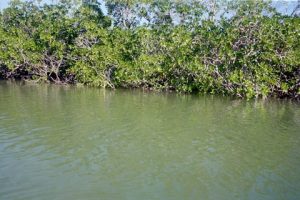 As a fishing guide, it is a slightly different situation. Since before I started guiding it became evident that there were people who wanted to know where I was fishing. I actually had people following me with binoculars. One of my original clients though I was paranoid when I talked about that. Ironically, we were being followed that very day. As a test I said “watch this” and I had my lure hooked on the first guide of the fishing rod , I reeled it up so that the rod was bent over and I started kicking with my leg in the water next to my kayak to make it look like a thrashing fish. I said “Let’s move up there but watch that boat that’s outside the signs”. We moved off and immediately this guy in the boat came motoring in (illegally) and ran right into the sandbar trying to get to the location where we were “catching fish”. The client was astonished but said “I am a believer now.” This is the inshore “hole jumper” version of the “numbers Pirate” offshore. Pathetic but in existence, they are both just parasites. After leading this particular individual to a number of the most barren fishless sandbars when I knew he was watching, he gave up pursuit.
As a fishing guide, it is a slightly different situation. Since before I started guiding it became evident that there were people who wanted to know where I was fishing. I actually had people following me with binoculars. One of my original clients though I was paranoid when I talked about that. Ironically, we were being followed that very day. As a test I said “watch this” and I had my lure hooked on the first guide of the fishing rod , I reeled it up so that the rod was bent over and I started kicking with my leg in the water next to my kayak to make it look like a thrashing fish. I said “Let’s move up there but watch that boat that’s outside the signs”. We moved off and immediately this guy in the boat came motoring in (illegally) and ran right into the sandbar trying to get to the location where we were “catching fish”. The client was astonished but said “I am a believer now.” This is the inshore “hole jumper” version of the “numbers Pirate” offshore. Pathetic but in existence, they are both just parasites. After leading this particular individual to a number of the most barren fishless sandbars when I knew he was watching, he gave up pursuit.
Being criticized for not divulging information is something that doesn’t bother me. On interviews or on the radio programs, the question regularly comes up, “where have you been fishing?” My answer is very likely to not only be vague but humorous. I could talk in generalities but even if I do, you might have more of the binocular people trying to rip off locations and ultimately do I really want to show up somewhere and see 150 other people working the area? I can scout my own fish for my clients successfully. I do not see any reason to hand off my intellectual property to people who refuse to do their own legwork. I’ll never understand professional fishing guides “giving away” all their information or their services for free. My clients are taught how to preserve their opportunities with respect for the resource.
Some agencies have wanted to make “fishing maps” in the past and I have been asked to share locations for them to put on maps that they will distribute publicly. My replies have been polite but many have rethought their projects after I have told them that people supplying them with information are unlikely to give up their best locations. I told them I wouldn’t.
The biggest risk is pretty straightforward. In the words of a shrewd local angler, “A shared spot is a lost spot.”
What you share is entirely up to you. Know this: You “own” the risks when you do. If you have shared someone else’s information you may have more to contend with, especially if it was spelled out for you from the beginning about preserving the locations. It is amazing to me that someone who has been given a gift would do that to the kind person who helped them out. If no one ever wants to take you fishing again, that’s yours to own.
As the recipient of information, do you respect what you have been given? When it is you who is sharing very specific information, do you have trust in the people you are giving the information to? If you choose to do it, even with gentlemen’s’ agreements, you are taking a chance.
Maybe you will have to just learn for yourself. For those that I help get into the sport, I am able to convince them to be more general with their information. You can still be helpful to people without “giving away the store.” It is within anyone’s rights to be stingy with information when it comes to fishing spots. There will always be pirates and parasites. Just don’t make it so easy for them and you should have fewer problems.
- The Neil Blog… - July 26, 2023
- The Catfish - July 26, 2023
- update - July 22, 2023
